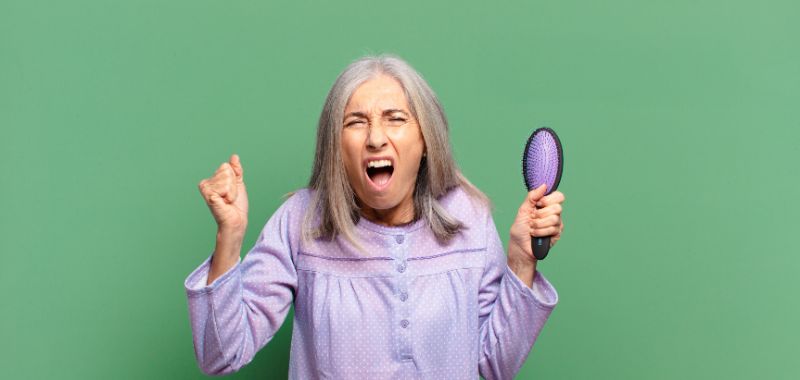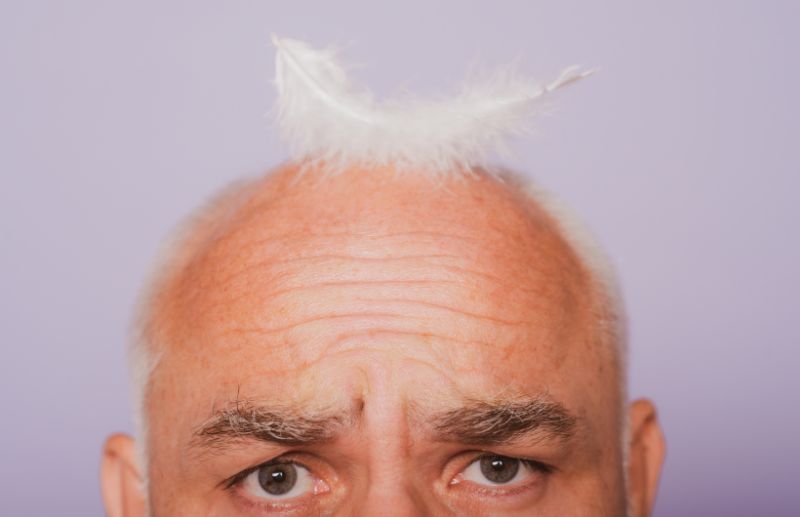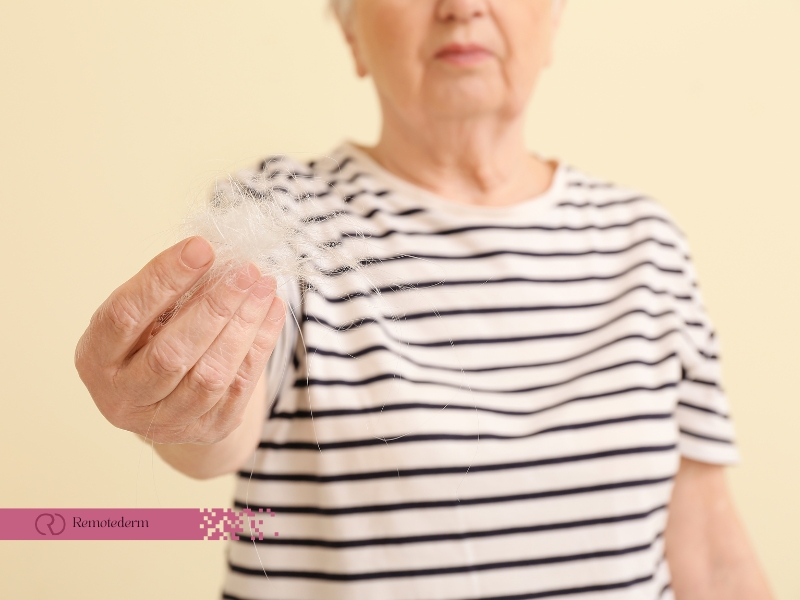Hair loss in the elderly is a common concern in Canada. As people age, thinning, receding, or falling hair can affect both men and women, impacting self-esteem and confidence. Understanding the causes and available treatments for hair loss in the elderly is crucial for those who want to maintain a healthy, full head of hair. Explore effective solutions to combat hair loss and regain your confidence as you age.
Causes of Hair Loss in the Elderly
As individuals age, they may face various challenges related to hair health. Several factors can contribute to hair loss in older adults:
- Hormonal Changes: Hormonal fluctuations can significantly impact hair growth cycles. In women, a decline in estrogen and progesterone during menopause may lead to thinning hair. In men, a decrease in testosterone can result in male pattern baldness.
- Genetics: Genetics play a crucial role in hair loss. If there is a family history of balding or thinning hair, an individual may be more prone to experience hair loss as they age.
- Medical Conditions: Certain medical conditions, such as thyroid disorders, anemia, diabetes, and autoimmune diseases, can contribute to hair loss in the elderly.
- Medications: Medications used to treat conditions such as high blood pressure, cancer, and depression may have side effects, including hair loss.
- Poor Nutrition: A lack of essential nutrients, including iron, zinc, and biotin, can lead to hair loss in older adults.
- Stress and Trauma: High levels of stress, emotional trauma, or significant life events can disrupt hair growth cycles, leading to hair loss.
How Do You Stop Hair Loss in the Elderly?
Stopping or slowing down hair loss in the elderly requires a multifaceted approach that includes lifestyle adjustments, medical treatments, and proactive management strategies. Here are some effective measures to consider:
- Consult a Professional: Seek advice from an online hair loss dermatologist or healthcare provider to diagnose the underlying cause of hair loss and recommend treatments.
- Maintain a Healthy Diet: Consume a balanced diet rich in vitamins and minerals like iron, zinc, and biotin, essential for hair health.
- Medications: Depending on the cause, medications like minoxidil and finasteride may help promote hair growth or prevent further loss.
- Hair Care Routine: Avoid harsh hair care products and excessive heat styling. Instead, use gentle shampoos and conditioners designed for thinning hair.
- Stress Management: Practicing stress-reducing techniques such as meditation, yoga, or exercise can help maintain hair health.
Hair Loss in Older Women
Hair loss in the elderly, especially in older women, can be distressing due to societal pressures and the cultural emphasis on appearance in Canada. Understanding the specific causes of hair loss in the elderly and finding tailored solutions can help alleviate emotional distress. Explore effective treatments to restore confidence and promote a healthy, fuller head of hair as you age.
Causes of Hair Loss in Older Women
Hair loss in older women can be attributed to a variety of factors. Understanding these causes can help in finding effective treatments and managing expectations. Here are some of the common causes extended with more details:
- Hormonal Changes: Menopause can lead to a decrease in estrogen levels, resulting in thinning hair.
- Female Pattern Hair Loss: Known as androgenetic alopecia, this condition causes gradual thinning of hair in women, usually starting with a widening of the part.
- Medical Conditions: As mentioned earlier, conditions like thyroid disorders and autoimmune diseases can contribute to hair loss.
- Stress and Emotional Strain: Chronic stress and emotional turmoil can disrupt hair growth cycles, leading to hair loss.

Treatments for Hair Loss in Older Women
Hair loss in older women can be a distressing experience, but there are several treatments available that can help manage this condition and promote hair growth. Here are some extended details on the common treatments:
- Medications: Minoxidil is a common treatment for female pattern hair loss and can promote hair growth.
- Hormone Replacement Therapy: In some cases, hormone therapy may help address hormonal imbalances and support hair growth.
- Nutritional Supplements: Ensuring an adequate intake of essential vitamins and minerals can support healthy hair growth.
Hair Loss in Older Men
Hair loss in older men is a widespread issue, often linked to male pattern baldness or other factors. Understanding the causes and potential treatments can help manage hair loss.
Causes of Hair Loss in Older Men
Hair loss in older men can be a distressing experience, but understanding the causes can help in managing the condition and finding effective treatments. Here are some of the common causes extended with more details:
- Male Pattern Baldness: Also known as androgenetic alopecia, this hereditary condition can cause thinning hair or bald spots, typically starting at the temples or crown.
- Hormonal Changes: A decrease in testosterone levels with age can lead to male pattern baldness.
- Medical Conditions: As with older women, conditions such as thyroid disorders, diabetes, or autoimmune diseases can contribute to hair loss.
- Environmental Factors: Exposure to pollutants, harsh chemicals, and UV radiation can impact hair health.

Treatments for Hair Loss in Older Men
Hair loss in older men can be a significant concern, but there are several treatments available that can help manage this condition and even promote new hair growth. Here are some extended details on the common treatments:
- Medications: Finasteride and minoxidil are common treatments for male pattern baldness and can slow down hair loss and stimulate hair growth.
- Hair Transplantation: This surgical procedure involves moving hair follicles from one part of the scalp to the thinning or balding areas.
- Low-Level Laser Therapy (LLLT): This treatment uses low-level lasers to stimulate hair follicles and promote hair growth.
- Scalp Micropigmentation: This cosmetic treatment involves tattooing the scalp to mimic hair follicles, creating the appearance of fuller hair.
Final Thoughts
Hair loss in the elderly can be a challenging experience for many in Canada, but there are options available to manage and even reverse the condition. Understanding the causes of hair loss and taking proactive steps to maintain healthy hair can help preserve both appearance and confidence. If you’re experiencing significant hair loss, consulting with an online hair loss dermatologist or healthcare provider is highly recommended to identify the underlying cause and explore effective treatment options. Take control of your hair health and regain your confidence today!
FAQs
1. Can wearing hats contribute to hair loss in the elderly?
Wearing hats does not typically cause hair loss. However, consistently wearing tight hats can cause hair breakage or follicle stress.
2. How long does it take to see results from treatments for hair loss in the elderly?
The timeline for seeing results varies depending on the treatment. It can take several months of consistent use of medications or other treatments before any noticeable improvement occurs.
3. Is there a link between hair loss in the elderly and thyroid issues?
Yes, thyroid disorders can affect hair health. Both an overactive and underactive thyroid can cause hair loss in older people.
4. Does alcohol consumption affect hair loss in the elderly?
Excessive alcohol consumption can cause poor nutrition and dehydration, which can worsen hair loss in the elderly.
